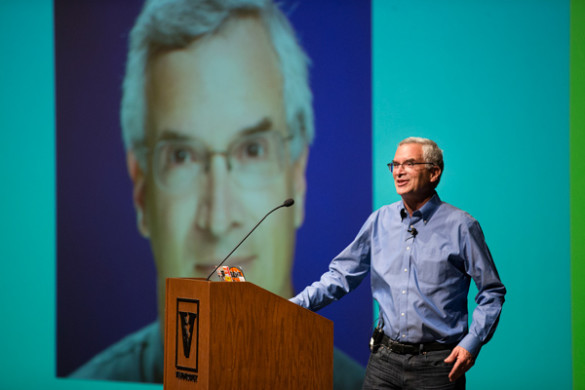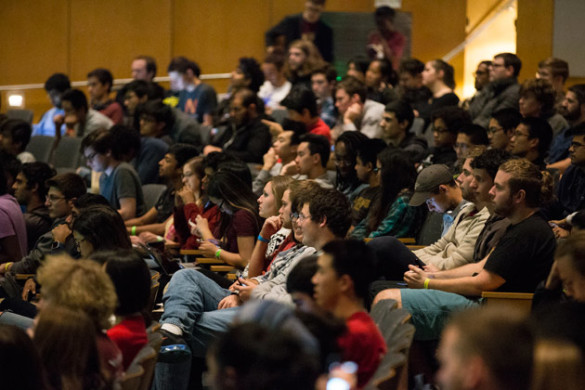
Facebook employed 10 people when it recruited Vanderbilt alumnus Jeff Rothschild to be its vice president for infrastructure software in 2005, relying on the already successful entrepreneur to set up engineering teams to support the burgeoning platform.
Rothschild thought he might stay a few weeks, he told an audience of about 450 participants, volunteers and supporters at VandyHacks, a 36-hour hackathon drawing participants from across the Southeast to the Wond’ry Friday night. He stayed 10 years, convinced by the constant positive feedback from users – “love letters,” he called those messages.
The small team decided early on that their competition wasn’t MySpace, the biggest social network at the time, Rothschild said. It was the family Christmas letter. If Facebook became what they hoped it would, the site would eliminate the need for those information-packed one-sheets tucked into Christmas cards, because everybody would already know what was happening.
Rothschild, who is vice chairman-elect of the Vanderbilt University Board of Trust, took the stage as VandyHack’s opening keynote speaker, telling participants from across the country that he could only share perspective from his own experience – they would go out, create their own accomplishments and form their own opinions that may be different.
But, for him, execution is everything.
“We’ve all had the experience of seeing a product enter the market and thinking, ‘I had that idea,’” he said. “Take a step back and consider why you didn’t do it. Maybe you had good reasons.
“But if you have the skills and ability and don’t do it, and you are trying to get someone to invest in you, it says something. It says something if someone shows a PowerPoint instead of a prototype.”

He urged students to look for “unfair” advantages, for instance, growing up in an industry and creating a business solution for it or using connections others may not have. They should “learn inefficiently” – working toward a solution rather than just asking someone that answer.
“I call it collateral learning,” he said. “The stuff you learn looking for the answer is always more valuable.”
And they should realize that the best work comes from a collective of minds, not just one person. That’s why Facebook founder Mark Zuckerberg once suspended certain project and dedicated the engineers on it to developing a platform that allowed anyone to submit apps, Rothschild said.
Rothschild began his education at Vanderbilt as a psychology major, showing the audience a photograph of himself being interviewed by young Nashville reporter Oprah Winfrey about a controversial psychology class he took. A course on Fortran coding caused him to shift gears, and Rothschild ultimately earned two degrees from Vanderbilt, a bachelor of arts in 1977 and a master’s in computer science in 1979.
Prior to joining Facebook, he co-founded Veritas Software and Mpath Interactive. Today, Rothschild, of Palo Alto, California, is a venture development consultant with Accel Partners, a privately held international venture capital firm that invests in technology companies.
VandyHacks is a completely student-led invention marathon. Founded in the spring of 2015, it was the first collegiate hackathon to call Nashville home. The Nov. 11-13 event was the third VandyHacks and wrapped up Sunday afternoon with an awards ceremony and closing speech from MicroStrategy Chief Technology Officer Tim Lang.